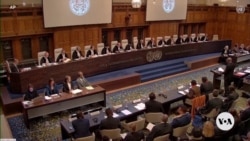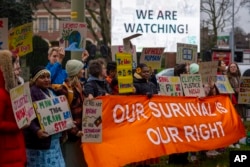In a landmark hearing Wednesday at the International Court of Justice in The Hague, the United States argued that human rights law is not relevant to nation states' legal obligations over climate change.
Margaret Taylor, a U.S. State Department legal adviser representing the U.S., argued Wednesday that the ICJ was the wrong forum for addressing climate justice.
"An advisory proceeding is not the means to litigate whether individual states or groups of states have violated obligations pertaining to climate change in the past or bear responsibility for reparations, as some participants have suggested," Taylor told the court.
"The U.N. climate change regime with the Paris Agreement at its core is the only international legal regime specifically designed by states to address climate change," she said. "International human rights law … does not obligate states to mitigate anthropogenic greenhouse gas emissions, nor does it currently provide for a human right to a healthy environment."
The United Nations General Assembly asked the ICJ last year to offer its legal opinion on whether major polluting nations can be held accountable for causing climate change and the harm it causes.
The 15 ICJ judges will consider not only legally binding climate agreements but also international human rights law and other relevant legislation.
Nearly 100 countries and more than a dozen intergovernmental organizations are set to give evidence across two weeks of legal proceedings that began on Monday and ends December 13. The judges are expected to give their legal opinion sometime next year.
Island states
Small island nation states have argued that rising sea levels due to climate change place their very existence at stake. Arnold Kiel Loughman, attorney general of the South Pacific island state of Vanuatu, argued that human rights law is applicable.
"I have come to ask you to uphold the rule of law," Loughman told the ICJ judges on Monday.
"Under international law, states have obligations ... to act with due diligence to prevent significant harm to the environment, to reduce the emissions and provide support to countries like mine, to protect the human rights of present and future generations, to protect and preserve marine environment, and to respect the fundamental rights of my people to self-determination in our own land.
"The failure by a small number of large emitting states to fulfill these obligations constitutes an internationally wrongful act, triggering legal consequences under the international law of state responsibility," he said.
Paris Agreement
The Paris climate agreement, which came into force in 2016, was signed by 195 countries, setting targets to reduce emissions and limit global warming to no more than 1.5°C above pre-industrial levels.
Many big polluters are reluctant to consider other legislation in relation to climate change, according to Nikki Reisch, director of the climate and energy program at the Center for International Environmental Law.
"We effectively heard them argue that the only relevant law from which any legal obligations can be sourced is the Paris Agreement. And when you actually look at the text of that agreement, it doesn't require very much," Reisch told VOA.
"We heard the U.S. really trying to encourage the court and others to ignore history, to sweep the historical conduct of many decades under the rug and saying what happened before the climate agreement was adopted doesn't really matter from a legal perspective, and that the knowledge for many decades of the causes and consequences of climate change isn't relevant," she said.
The judges' opinion is advisory and won't be legally binding. Nevertheless, it will have implications for all nation states, Reisch said.
"This advisory opinion will be an authoritative interpretation of what binding international law requires. So, it will carry weight as a kind of legal blueprint for accountability, or a guide for courts and advocates around the world to understand what international law requires and what we should be holding states to in terms of their climate action and their measures to remedy climate harm," she said.
















